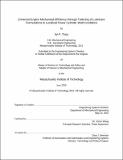Enhanced engine mechanical efficiency through tailoring of lubricant formulations to localized power cylinder wall conditions
Author(s)
Tracy, Ian P
DownloadFull printable version (4.074Mb)
Other Contributors
Massachusetts Institute of Technology. Department of Mechanical Engineering.
Advisor
Victor Wong.
Terms of use
Metadata
Show full item recordAbstract
Numerical and experimental studies were performed on an internal combustion engine power cylinder wall's lubricating oil film in order to assess the possibility of tailoring engine lubricants to specific engine configurations and operating conditions for significantly enhanced fuel economy without an accompanying increase in engine wear. An array of different base oil viscosity modifier type combinations were developed, tested, and analyzed in order to seek trends that link lubricant mixtures to certain rheological behaviors along the cylinder wall of a fired internal combustion engine. Viscosity modifiers were applied in an unconventional manner so as to increase viscosity at high operating temperatures rather than decreasing viscosity at low temperatures for promoting reliable cold-cranking. Consequently, a novel form of multi-grade lubricant was developed and simulated for determining potential fuel economy gains through its use. Both numerical simulation and a physical, laser-induced fluorescence diagnostic apparatus for an Isuzu 4JJ1 light-duty diesel engine were implemented in parallel to aid the development and validation of a reliable engine friction and wear model. Preliminary results have been insightful and coincident with classical continuum mechanics theory. Internal consistency across the developed model and physical diagnostics was considerable. It is concluded that the tailoring of lubricant formulations can realize substantial fuel economy gains, and that oil & gas companies may realize significant competitive advantage and profit should they successfully inspire customers to consider purchasing lubricants that have been designed specifically for their automobile and driving habits. It is further proposed that the standards associated with lubricant classification be improved so as to consider the use of viscosity modifiers as mitigators of engine power cylinder wear at high cylinder temperatures near top dead center (TDC).
Description
Thesis: S.M. in Technology and Policy, Massachusetts Institute of Technology, Engineering Systems Division, Technology and Policy Program, 2015. Thesis: S.M., Massachusetts Institute of Technology, Department of Mechanical Engineering, 2015. This electronic version was submitted by the student author. The certified thesis is available in the Institute Archives and Special Collections. Cataloged from student-submitted PDF version of thesis. Includes bibliographical references (pages 74-75).
Date issued
2015Department
Massachusetts Institute of Technology. Engineering Systems Division; Massachusetts Institute of Technology. Department of Mechanical Engineering; Technology and Policy ProgramPublisher
Massachusetts Institute of Technology
Keywords
Engineering Systems Division., Technology and Policy Program., Mechanical Engineering.